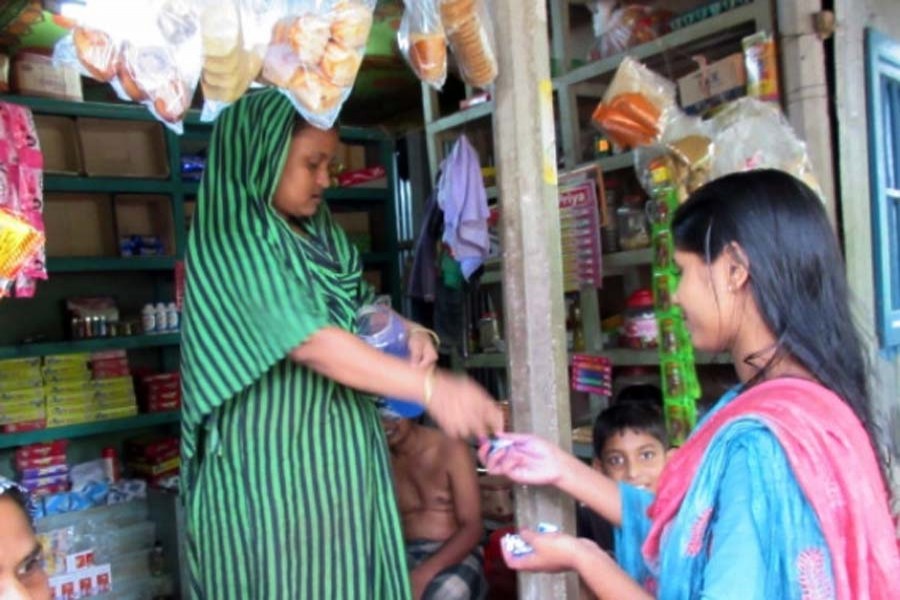UN Secretary General Antonio Guterres looked into the case for womenfolk on the International Day of Rural Women on last October 15 with great expectation. In his message on the day he said, "The empowerment of rural women and girls is essential to building a prosperous, equitable and peaceful future for all on a healthy planet." As presumed, the words struck a highly sympathetic chord with all suppressed women in different parts of the world. In Bangladesh, different rights groups and women's welfare organisations arranged programmes to highlight the significance of the day. Like in the previous years, they have focused on the plight of the rural women and girls in Bangladesh. Women in both the urban and rural areas have customarily been discriminated against for long. It is the village women who mostly bear the brunt of a socio-economic system dominated by males.
The scenario is not much different in the broader spheres of the world. With women in 2018 leading governments, behemoth organisations and business enterprises, majority of them in many other countries are found relegated to the margins of society. Irrespective of different countries' place on global scale, the urban women in general are found better placed compared to those in the rural areas. In villages around the globe, women and girls continue to contribute to their families, communities and the greater society. But their sincere efforts and labour remain unsung. This is the common picture which prevails acutely, and almost invariably, in the less developed countries, spanning from Peru, Bolivia, Benin or Zimbabwe to India or Bangladesh.
Since the dawn of the early civilisations, women have been deprived of many rights and privileges enjoyed by their male counterparts. Their conditions have only deteriorated through the passage of time, reaching a climax of sorts in the Middle Ages of Europe. Ironically, the continent of Europe was then riding the crest of the enlightening period of Renaissance. During this otherwise glorious period, mentally challenged and isolated women were being hounded on suspicion of being witches, many burnt alive. The following centuries did not see much of a change. Compared to Europe, women in the Orient in the distant past--- South Asia in particular, enjoyed some semblance of social recognition. Woefully, this has continued to plummet finally to a stage where women found themselves without an identity. Throughout the 20th century and in the first two decades of the 21st, women in Bangladesh are no different from their likes in the neighbouring countries.
However, the city-based women in Bangladesh have long been able to carve out a tolerably comfortable place for themselves. The picture is different in the rural areas. In the villages of the country, women and girls are born shorn of some of their veritably inalienable rights. As a girl child keeps stepping into adolescence and then womanhood in a male-dominated society, she is constantly reminded that some areas in her mundane life are off-limits to her. Although the Muslim women enjoy their right to some portions of their parental properties, women in general remain deprived of many such entitlements. The picture is worse in villages.
The injustice which affects women in general in Bangladesh comprises the non-recognition of their work that goes unnoticed. This nature of work begins from the family. In spite of their endeavours and physical inputs to ensure that the families run smoothly, these efforts are hardly recognised. The term used nowadays to define these silent efforts is 'unpaid work'. Thanks to the nature of this work, women's rights protection groups and activists worldwide have adopted an uncompromising stance on preventing this injustice. An unflinching camaraderie has ensued. Majority of the males tend to overlook this social, as well as economic, aberration. Many take recourse to the plea of the so-called rule and dictates of nature. In fact, excuses like this have continued to be presented by the male-dominated societies since men began leading the labour sector.
It's an irony that the England-based Industrial Revolution in the 18th and 19th centuries, despite its far-reaching social impacts, could not fully come free of the anti-woman baggage. With male workers at the helm of the newly invented production-related machinery, women discovered themselves mostly as helping hands. In the British-ruled sub-continent, the Industrial Revolution dealt a great blow to the rural cottage industries, rendering the artisans jobless. Women constituted a large segment of this labour force; many would earn their livelihood by putting into operation their own small-capital and informal set-ups. Those times were replaced by that of suffering in silence. With isolated exceptions in the independent countries in the sub-continent after 1947, and in Bangladesh after 1971, the lot of the womenfolk did not see a process of change taking root. As for the latter-day solidarity between women, many point to the bitter realities afflicting their lives. In many cases women's place in society kept deteriorating.
The scourge of unpaid work stems mainly from the male tendency to play a domineering role in every segment of socio-economic layers. This chain of labour begins from the family. Like in most of the less advanced countries, the general tendency in Bangladesh is to keep women confined to the traditional household chores, dominated by home making and child rearing. Here, too, their roles remain undocumented.
In villages in particular, women have traditionally been contributing to agriculture, livestock farming and many other male-dominant areas of work. As in their family-based works, they are found toiling away without being recognised. They are paid less than their male counterparts for the similar work. Apart from being deprived of their due wages, they are made to relegate themselves to a humiliating position. Their labour is not recognised as a family income; rather it is considered a means to minimise production cost of family ventures like agriculture. Adverse situations, thus, result in a virtually socially-orchestrated impediment to the achievement of women's empowerment. Redefining this pitiable status of our women has been overdue for long.
shihabskr@ymail.com


